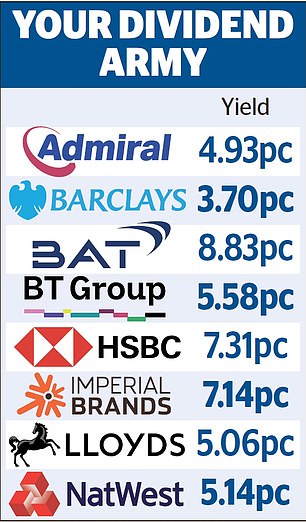With more interest rate cuts on the horizon, you can now protect your income with the fantastic Footsie
Will they or won’t they? That’s the question many are asking about the members of the Bank of England’s rate-setting Monetary Policy Committee (MPC).
Will they make one or two more cuts this year and will they act on them as early as next month, given this week’s favorable economic numbers?
But while lower interest rates are a boon for borrowers, millions of people are left wondering how they can make an income.
Banks are already cutting yields and National Savings & Investments has exceeded its Treasury-set funding target. Premium bonds and other schemes could soon be paying less.
But if you want to improve your income, now might be the time to explore the stock markets. Share prices have recovered from the recent turbulence. The FTSE 100 is up 8 percent year-to-date and the US S&P 500 is up 17 percent.
Vanguard: If you want to improve your income, now might be the time to explore the stock markets
Duncan Lamont of asset manager Schroders emphasises the advantages of equities: ‘As evidence from 1926 to 2023 shows, equities are less risky than cash when it comes to delivering long-term returns that outpace inflation.’
In the second quarter, dividends from UK companies rose 11.2 percent to a record £36.7 billion.
Investment platform AJ Bell’s Dividend Monitor shows that FTSE 100 companies will pay out £78.6 billion this year and £83.9 billion in 2025.
If you also want to enjoy this wealth, here are the routes you can explore.
SHARES
The new focus on dividends is evident from the 14 percent rise this week in shares of insurer Admiral, owner of Confused.com.
Milena Mondini de Focatiis, general manager of Admiral, announced that the number of customers and profits would increase, but the city was almost more enthusiastic about the dividend, which was higher than expected.
Admiral’s dividend yield is 4.93 percent (this figure is calculated by dividing the dividend by the share price). The average yield for the FTSE 100 is 3.6 percent.
Many companies are more generous, such as telecom giant BT with 5.58 percent and tobacco group Imperial Brands with 7.14 percent.
However, investors should be careful, as returns rise as share prices fall, which can lead to problems.

For example, the yield on British fashion house Burberry is an attractive 9.15 percent.
But the troubled company suspended its dividend last month while simultaneously replacing its CEO.
Telecom group Vodafone’s yield is 10.63 percent, but payouts are being halved to fund mobile network spending.
Richard Hunter of broker Interactive Investor recommends taking a close look at yield and dividend coverage – that’s how often a company can pay dividends out of profits. A figure of 1.5 or more is acceptable. Anything below that is risky.
Taking into account ‘a high yield, sufficient coverage, an acceptable price performance and a positive market consensus on the outlook’, Hunter prefers British American Tobacco, which has a yield of 8.83 percent.
He also likes HSBC, which is offering 7.31 percent. Like other banking groups, HSBC will be hit by a fall in interest rates because it shrinks the bank’s net interest margin – the key indicator of lending profitability.
But a return to the near-zero rates of the pandemic is highly unlikely, and falling borrowing costs will limit defaults.
From this perspective, it may be worth looking at Barclays with a dividend yield of 3.7 percent, Lloyds (5.06 percent) and NatWest (5.14 percent).
FUNDS
It takes time to determine whether a company is being stingy or recklessly generous with its dividends, so it can be useful to diversify your investments across a fund or trust.
Bestinvest, Fundcalibre and Interactive Investor recommend names such as Artemis Income, City of London and Murray Income (which I have a stake in). These focus on FTSE 100 companies. For some exposure to small and mid-caps, options include the WS Gresham House UK Multi Cap Income fund. Its manager, Brendan Gulston, says these companies can provide “a stable dividend stream”.
Premier Foods, which owns Mr Kipling, is among the fund’s holdings. Gulston said: ‘Thanks to its strong brand portfolio, Premier has delivered a 20 per cent compound annual increase in its dividend yield from 1p per share in the 2021 financial year to 1.729p in 2024.’
The fund also invests in Bloomsbury, the publisher of the Harry Potter books and Sarah J Maas’s bestselling ‘romance’ novel House Of Flame And Shadow. The company has more than doubled its interim dividend to 3.70p per share, up from 1.41p a year.
Gulston says Bloomsbury’s ‘long-term growth is supported by a robust financial position, as well as by strategic acquisitions.’
DIY INVESTMENT PLATFORMS

AJ-Bel

AJ-Bel
Easy investing and ready-made portfolios

Hargreaves Lansdown

Hargreaves Lansdown
Free Fund Trading and Investment Ideas

interactive investor

interactive investor
Fixed investment costs from £4.99 per month

Saxo

Saxo
Get £200 back on trading fees

Trading 212

Trading 212
Free trading and no account fees
Affiliate links: If you purchase a product, This is Money may earn a commission. These deals are chosen by our editorial team because we think they are worth highlighting. This does not affect our editorial independence.
Some links in this article may be affiliate links. If you click on them, we may earn a small commission. That helps us fund This Is Money and keep it free. We do not write articles to promote products. We do not allow commercial relationships to influence our editorial independence.
